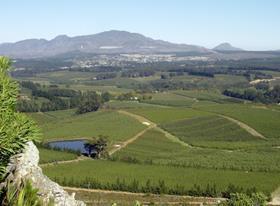
As the City of Cape Town further tightens its water restrictions following poor winter rainfall, fruit growers in the Berg River, Olifants River, Ceres, Vyeboom and other regions are wondering just how they will get through the summer.
Key to answering this question will be just how much water of the already low levels in the region’s storage dams will be allocated to agriculture.
Latest figures indicate that the region’s dams have just over 30 per cent of reserve water. The agricultural sector is competing with the sprawling urban areas of Cape Town and surrounding towns for its share.
So what would have been a joyous mood at the start of the spring, with great expectations about good harvests, has given way to concern about just what the following months will yield.
The City of Cape Town has approved Level 5 water restrictions, effective from 3 September 2017 until further notice. Level 5 restrictions entail a ban on all use of municipal drinking-quality water for outside and non-essential purposes.
Existing tariffs remain unchanged, but domestic properties with usage above 20 kilolitres per month will be subject to excessive water consumption fines.
Fruitnet has travelled through most of the table grape regions over the past three weeks. Our South African team found moods ranging from outright despair in some regions, to extreme optimism about the crop in others.
The concern in the Western Cape grape regions is countered by a very even early season budding in the Orange River, indicating that growers there can expect another bumper crop after packing more than 20m cartons for the first time last season.
Things could not be more different in the Olifants River where growers are wondering how they will get through the season unless the situation change dramatically in the next few weeks.
The situation is critical in the Vredendal region, while further up the river towards Clanwilliam prospects are slightly better. The Olifants River is also the region where most of the Western Cape’s citrus are grown and the present situation does not bode well for next season in the Citrusdal and Clanwilliam areas.
Growers in the Bergriver, which relies on the dams further upstream from Paarl to ensure sufficient water for the season, whether they are grape or stonefruit growers, will have to wait and see how much they will get for the season. Things are also critical in some areas of the Villiersdorp region which is a big apple and pear region.
Well-known apple and pear grower, Dr Paul Clüver, says the growers in the Elgin region are much better off and should see the season through.
In the Hex River, one of South Africa’s most important table grape regions, growers are concerned following reports that their storage dam which supplies the whole valley is also at low levels.
The City of Cape Town has also introduced emergency measures to access more water for its citizens. This includes desalination of sea water, as well as utilising deep level water supplies located under the region's mountain ranges.
The Western Cape government is also considering emergency aid to the agricultural sector to prevent job losses as a result of the drought.
With September being tourism month in the Western Cape, it is not surprising that the local government is targeting the tourism sector to spread its message of the need to conserve water.
Alan Winde, minister of economic opportunities, says the government, while recognising the enormous contribution tourism makes to the region’s economy, will be looking at sustainable and responsible practices being pioneered by hospitality establishments, especially in this time of pressure on the region’s natural resources.



